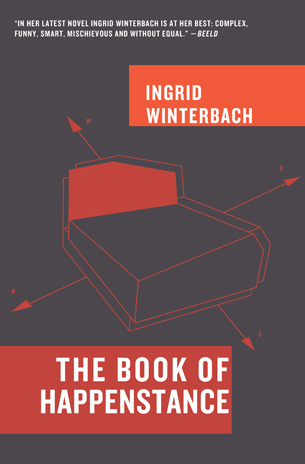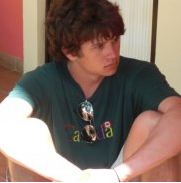The Book of Happenstance
Ingrid Winterbach
Open Letter Books
Paperback, 254 pages, $11.95
978-1-934824-33-7
.
Though Ingrid Winterbach sets her novel, The Book of Happenstance, in contemporary South Africa, a country dominated by a history of racial oppression, the book is not about race or the inheritance of Apartheid. The Book of Happenstance is about memory and death, yet paradoxically so, for the novel is ebulliently alive, ironic and smart. The characters seem hyper-linked to Google and Wikipedia; the book is full of spontaneous eruptions of intelligence, and that is fun to read.
Winterbach (who wrote earlier works under the pseudonym Lettie Viljoen) lives in South Africa with her husband and two daughters. She has a degree in Afrikaans—one of the main characters of the novel is an expert in Afrikaans. She is also a visual artist and has won all kinds of awards for her work in her native land including the W. A. Hofmeyr Prize, the M-Net Book Prize (for the book in hand), the University of Johannesburg Award, and the Hertzog Prize. The new English version of The Book of Happenstance, just out with Open Letter Books, was co-translated by Winterbach herself and Dirk Winterbach (I checked but was unable to pin down the relationship).
The novel is about a middle-aged woman, Helena Verbloem, hired on a research grant to help compile a dictionary with the scholar Theo Verwey. One night thieves break into Helena’s house, steal her sentimentally priceless sea shell collection, and shit on the floor. When the police appear uninterested in helping her recover the shells, Helena starts investigating the robbery herself. Some of the missing shells have turned up at the feet of a recent suicide, a man who killed himself by hanging.
The shell investigation trajectory involves two visits to a town a day’s drive away where the suicide (and his family) lived. Helen and her girlfriend Sof meet the locals in bars, disguise themselves as members of a Bible group delivering pamphlets, take pictures of the suicide house, question family and friends and come up with precisely nothing. In fact, what they learn is that the shells are gone, who knows where, and that her house had been broken into by accident by men looking for drugs. At one point Sof quotes the opening lines of Kafka’s The Castle: K has just arrived, the Castle is hidden in mist and fog, the village shrouded in snow, gazes up into “seeming emptiness.” Of course, the passage is even more enigmatic because it’s quoted in Afrikaans.
The shell plot is comic and Kafkaesque and ends in apparent inconsequence. The novel’s parallel plot belongs to Theo and Helena in the museum—less action than the quasi-investigation plot but many delightful scenes. The work scenes go like this: Theo and Helena sit in an office organizing words into alphabetical order, Helena fantasizes, talks about books, sometimes she asks Theo about a word and he—a human dictionary—answers with comic completeness in little essays like entries in an etymological database. Helena is obviously attracted to Theo, but the attraction is an intellectual crush not so much a romantic longing and certainly not lust.
Slotted between the interwoven main plots are a series of recurring but unplotted scenes in a tea room, more often than not Helen and another museum friend drinking, yes, tea and discussing the origin of life and evolution. These scenes are comic, exasperating—Helena’s naïve and ingenuous questions prompting lengthy, erudite answers which she seems to ignore half the time (inserting lengthy parenthetical scene commentary in the middle of the explanations). Helena’s interest in life no doubt evolves out of the context of death that surrounds her. Already, as novel begins, Helena’s parents and sister are dead, her brother estranged, she herself is divorced, her daughter is out of touch.
The novel is written in the first-person present tense. The present tense conveys immediacy and a kind of spontaneous propulsion that more conventional past tense Freitag-ular narratives don’t. In other words, Winterbach’s novel didn’t happen it keeps happening, throwing itself forward with a kind of whimsical blind hopefulness, a summoning of eternity.
In the first two sentences Winterbach announces the time frame of the novel: March to October—in March Helena starts working on the Afrikans dictionary with Theo Verwey, and by October Theo is dead. At the outset, we know the parameters, we know the course of the novel; Winterbach seems to splice the story out of the larger reel of time and in the same act warrant its significance, as Walter Benjamin suggests in his essay “The Storyteller.” “Death is the sanction of everything that the storyteller can tell. He has borrowed his authority from death.”
Much of the novel consists of memories and reflections. When writing the memories Winterbach steps in and makes a stylistic choice. She writes a number of the memories in the past tense and some in the present and, a few times, seems to mix the two. The weaving of tenses together seems to add to the eternal bracket around the novel. Winterbach wants Happenstance to break out of linear time and rest securely in the present. Therefore, even the memories, past events, occasionally happen in the present. There is, I think, an ironized search for the eternal in the novel. The shells in their way seems to represent something beyond time to Helena, considering “their beauty restored [her] trust in all of creation” (59). At one point Helena’s friend Sof says, “I’ve just read and interesting article… All writers are actually pursuing a single ideal, namely the universal.” To which Helena replies dryly, “I’ve always thought the universal to be suspect.” (130). But her denial rings with irony.
Happenstance is a terrific read. It is consciously intellectual without being pretentious or didactic. It is smart and knows it but the irony runs deep. Against the etymology, we have Helena obsessing over the shit on her carpet; she associates the lingering smell of aftershave in her apartment with crime, so that she qualifies every clean-shaven man with the thought: Could he have shat on my rug and stolen my shells? And then there is the whole Sof/husband subplot: Sof’s hatred for her husband and her desire to have an affair with a crippled pediatrician. Even Theo’s funeral has a comic aspect: a member of the museum staff, nicknamed Sailor, shows up drunk, wearing a natty white suit, and tries to jump into the grave with the coffin.
Finally: Why happenstance? The title of the English translation seems to refer the coincidental nature of the crime, the shell-robbery, perhaps the Kafkaesque and coincidental nature of all life. The novel forces the death of Theo Verwey and the loss of Helena’s shells together, but their juncture is conditional, fleeting and evanescent, means almost nothing except in the pleasurable connection of words, obsession, human affection, and our ultimate end (itself likely to be comic). It is all happenstance.
(Read an excerpt from the novel here.)
—Jacob Glover
.
Jacob Glover is studying Classics & Philosophy at the University of King’s College in Halifax, Nova Scotia. His work has been published previously on Numéro Cinq: essays (on Kierkegard, Montaigne, and Spinoza), translations, and poems.
.
.
.



Nicely done. Sounds like a fun read, sort of the anti-Coetzee novel. (I love Coetzee, so that’s not a crack on him.)
Loved this:
“Against the etymology, we have Helena obsessing over the shit on her carpet; she associates the lingering smell of aftershave in her apartment with crime, so that she qualifies every clean-shaven man with the thought: Could he have shat on my rug and stolen my shells? And then there is the whole Sof/husband subplot: Sof’s hatred for her husband and her desire to have an affair with a crippled pediatrician.”
This alone makes me want to read!
Jacob, thanks for the review. You offer a great sense of what seems to be a very complicated narrative … sounds like my kind of book. I’ll have to see how Winterbach managed to accomplish this in so few pages.
Louis Pasteur was writing about biology when he said that “… chance favours only the prepared mind.” Jacob, life may be happenstance, but you are well-positioned to make the best of what comes. This is a brilliant review. You’ve conveyed a great deal – about the author, the plots, the pov, the settings, the structure, the characters, the tensions, the questions, and even the title – all tied up in a clear, concise logical package. Thank you.